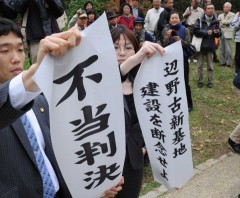Naha court rejects need for new environmental assessment for Futenma relocation

At 2:12pm on February 20, at the Naha District Court in the Higawa area of Naha, plaintiff lawyers held up a piece of paper on which the words “Unjust ruling” were written.
February 21, 2013 Ryukyu Shimpo
On February 20, the Naha District Court rejected a lawsuit in which 621 plaintiffs claimed that the central government’s approach to the environmental impact assessment (EIA) for the relocation of the facilities currently at Futenma to the coastal area of Camp Schwab in the Henoko district of Nago was flawed. The plaintiffs, people both from inside and outside of Okinawa, demanded that the EIA preparatory documents and details of how it would be carried out, be redone, and sought compensation for perceived breaches of the law. Presiding Judge Ryosuke Sakai stated that the residents did not have the right to lodge such a lawsuit, and did not go any further into the issue of the illegalities in the EIA procedure that were pointed out, so the plaintiffs totally lost the case.
With regard to whether or not they will appeal against the ruling, the plaintiffs said, “We cannot allow it to end like this. We will decide what to do after all of the plaintiffs, including local residents, have considered the situation.”
The plaintiffs argued that the central government conducting the EIA in an illegal manner deprived them of their right to express their opinions, something that is guaranteed in the Environmental Impact Assessment Law. In response, the judge pointed out that the law does not guarantee the right to statements of opinion by individuals despite providing residents the opportunity to express their opinions. The judge dismissed the case, stating that the party that initiates a project is not obliged to reflect the opinions of individual residents in its report, nor to answer any questions they may raise.
With regard to the assertion that the government’s failure to release the report violated the human rights of Nago and Ginoza residents who could be affected by the Futenma relocation, the judge stated that the central government conducted the EIA in order to collect environmental information on the area in question, and that the law does not guarantee the residents’ right to express their opinions.
The central government asserted that the law does not stipulate that residents can lodge a lawsuit, and requested that the judge reject the claim by the residents and the demand for compensation.
While the government started the EIA process in 2007, and did publicly call for residents to express their opinions through inspection and explanatory sessions, it repeatedly made revisions and additions to the report. Because the government announced the deployment of the Osprey at a stage in the process that the residents no longer had the opportunity to express their opinions, citizens groups and intellectuals have criticized the government for “cheating” in the process as well as being “unscientific and undemocratic.”
(English translation by T&CT, Mark Ealey)
Previous Article:Ryukyukoku Matsuri Daiko commemorates 30th anniversary
Next Article:Okinawa International Movie Festival to kick off on March 23
[Similar Articles]
- Court rejects Henoko residents’ call for a new impact assessment
- One in two Kadena residents are plaintiffs in the fourth Kadena noise lawsuit
- Residents around Kadena Air Base sue the U.S. government
- Japanese court dismisses Kadena noise suit against U.S., citing lack of jurisdiction
- Futenma roar appeal dismissed by Supreme Court without issuing a flight ban
 Webcam(Kokusai Street)
Webcam(Kokusai Street)


